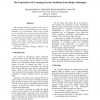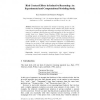123 search results - page 2 / 25 » Cognitive Context and Arguments from Ontologies for Learning |
COOPIS
2004
IEEE
13 years 8 months ago
2004
IEEE
Semantically heterogeneous and distributed data sources are quite common in several application domains such as bioinformatics and security informatics. In such a setting, each dat...
COLING
2002
13 years 4 months ago
2002
In this paper we investigate the task of automatically identifying the correct argument structure for a set of verbs. The argument structure of a verb allows us to predict the rel...
COGSCI
2010
13 years 5 months ago
2010
many abstract categories (e.g., ``equivalence'') is innate. Although Plato argued with his contemporaries who advocated the empirical basis of knowledge, it was the Briti...
ICALT
2006
IEEE
13 years 11 months ago
2006
IEEE
The teaching/ learning of cognitive skills, such as problem-solving, is an important goal in most forms of education. In well-structured subject areas certain exercise problem typ...
CONTEXT
2007
Springer
13 years 11 months ago
2007
Springer
Mechanisms that underlie the inductive reasoning process in risk contexts are investigated. Experimental results indicate that people rate the same inductive reasoning argument dif...


